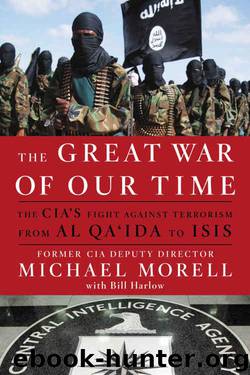The Great War of Our Time: The CIA's Fight Against Terrorism--From Al Qa'ida to ISIS by Michael Morell

Author:Michael Morell [Morell, Michael]
Language: eng
Format: epub
Tags: Political Science / Intelligence & Espionage, True Crime / Espionage, Biography & Autobiography / Political
ISBN: 9781455585663
Publisher: Twelve
Published: 2015-05-12T07:00:00+00:00
* * *
When I was serving as deputy director, my staff would put together a reading package every Friday for the weekend. Dozens of highly classified multi-page documents would be sent home with me when I left Langley on a Friday evening. I stored these documents in a safe in what we call a Sensitive Compartmented Information Facility, or SCIF for short. The SCIF itself, sort of like a small bank vault, was in my attic and was protected by multiple alarm systems and security cameras. And my security agents were never far from my home.
In August 2011, when I was serving as acting director for the first time, I poured myself a cup of coffee, pulled the weekend reading material from the safe, put the pile on my lap, put my feet up, and started to read. About halfway through the pile was a paper produced by our counterterrorism analysts outlining their take on the information derived from a treasure trove of documents scooped up during the Bin Ladin raid. I had been waiting for this paper, so I settled in for a thorough, word-by-word read.
I was not surprised by most of what I read. One of the many takeaways from the DOCEX (document exploitation) from Bin Ladin’s office at Abbottabad was that al Qa‘ida was still very much intent on attacking the West. The documents showed that Bin Ladin, in the months before his death, had been engaged in ongoing discussions with his key operatives about pursuing mass casualty attacks in the United States and against the infrastructure that operates the global oil industry—oil pipelines, terminals, and tankers. The oil industry has long been a target of al Qa‘ida (in February 2006, al Qa‘ida attacked Saudi Arabia’s Abqaiq facility, the largest oil processing facility in the world, responsible for half of Saudi oil exports). And, as expected, Bin Ladin had underscored the group’s enduring interest in attacking commercial airlines.
As I read on, I became more engrossed in the paper. The captured documents also made clear that the United States was still by far the primary target of al Qa‘ida. Bin Ladin considered us enemy number one, calling us “the leader of the nonbelievers.” And although the United States and its partners had done great damage to the terrorist group’s central leadership operating out of the tribal areas of Pakistan, al Qa‘ida, and similar groups inspired by it, was still intent on attacking us and still capable of inflicting significant damage. When I finished reading, I just sat there. The paper had reinforced all my instincts about the group.
The one thing that surprised me was that the analysts made clear that our pre-raid understanding of Bin Ladin’s role in the organization had been wrong. Before the raid we’d thought that Bin Ladin’s deputy, Ayman al-Zawahiri, was running the organization on a day-to-day basis, essentially the CEO of al Qa‘ida, while Bin Ladin was the group’s ideological leader, its chairman of the board. But the DOCEX showed something quite different.
Download
This site does not store any files on its server. We only index and link to content provided by other sites. Please contact the content providers to delete copyright contents if any and email us, we'll remove relevant links or contents immediately.
| Elections & Political Process | Ideologies & Doctrines |
| International & World Politics | Political Science |
| Public Affairs & Policy | Specific Topics |
| United States |
The Secret History by Donna Tartt(19007)
The Social Justice Warrior Handbook by Lisa De Pasquale(12178)
Thirteen Reasons Why by Jay Asher(8875)
This Is How You Lose Her by Junot Diaz(6862)
Weapons of Math Destruction by Cathy O'Neil(6252)
Zero to One by Peter Thiel(5772)
Beartown by Fredrik Backman(5719)
The Myth of the Strong Leader by Archie Brown(5484)
The Fire Next Time by James Baldwin(5416)
How Democracies Die by Steven Levitsky & Daniel Ziblatt(5201)
Promise Me, Dad by Joe Biden(5132)
Stone's Rules by Roger Stone(5068)
A Higher Loyalty: Truth, Lies, and Leadership by James Comey(4942)
100 Deadly Skills by Clint Emerson(4901)
Rise and Kill First by Ronen Bergman(4765)
Secrecy World by Jake Bernstein(4732)
The David Icke Guide to the Global Conspiracy (and how to end it) by David Icke(4687)
The Farm by Tom Rob Smith(4490)
The Doomsday Machine by Daniel Ellsberg(4476)
